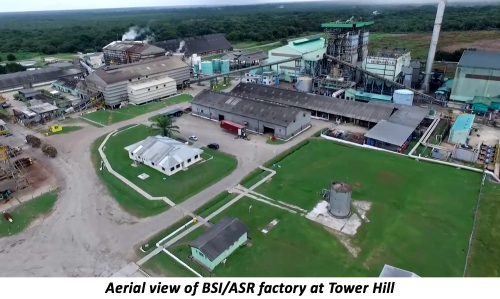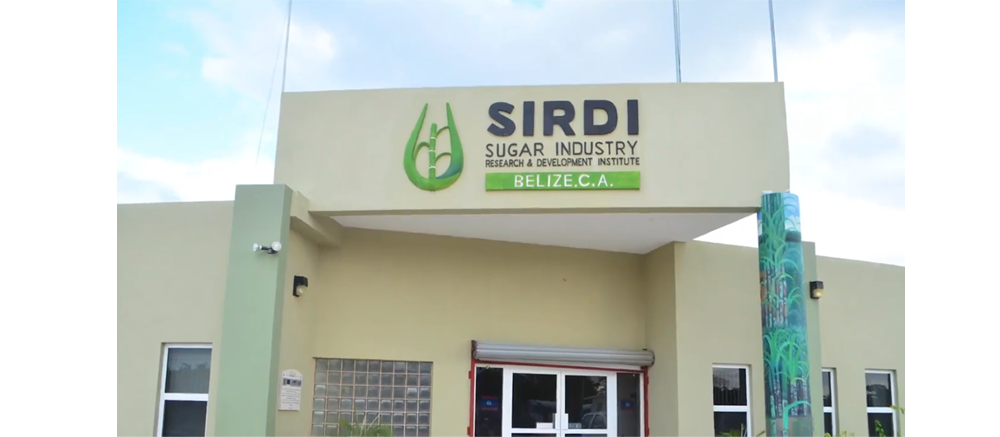Photo: SICB recently relocated its offices from Orange Walk Town to the headquarters of the Sugar Industry Research and Development Institute along Mile 66.5 of the Philip Goldson Highway in Buena Vista Village
BSI’s attorney says SICB could be required to return millions – “I’m not quite sure going back for how long,” he said.
BELIZE CITY, Thurs. Aug. 10, 2023
A ruling handed down by High Court Justice Patricia Farnese regarding sections of the Sugar Industry Act, Chapter 283 of the Substantive Laws of Belize, Revised Edition 2020, which were challenged by the claimant, BSI, is being deemed as consequential for the sugar industry in Belize. Its implications may be seismic, some believe. While the claimant’s attorney, Godfrey Smith, admits it’s not a landmark ruling, given that the central issue has been argued before in the Commonwealth Caribbean, he says it is new for Belize.

The constitutional challenge was brought by Belize Sugar Industries Ltd. (BSI) and cane farmer Russel Navarro. The claimants were represented by Senior Counsel Godfrey Smith and attorney Hector Guerra, while the Attorney General was defended by Assistant Solicitor General Samantha Matute and Alea Gomez. The hearing took place on February 24, 2023, and the ruling was given on Monday, August 7.
As laid out in the introduction of the judgment, BSI and Navarro sought declarations that provisions in the Act which “regulate their private contractual interests are null and void because the provisions are discriminatory and violate their constitutional rights to equal protection, to work, and to free association.” BSI additionally argued that to be required to pay an export levy and annual levies to the Sugar Industry Control Board (SICB) and its authorized agencies to help fund its operations, violate their right to property. The Attorney General argued, however, that if any violations exist, they are justified, as they would be in the public interest. Justice Farnese found that certain provisions of the Act indeed violate the claimants’ constitutional rights, but the ruling was not entirely favourable to the claimants.
One significant declaration by Justice Farnese is that Navarro’s constitutional rights to work and to free association have been violated by the de facto requirement contained in sections 17, 19, and 20 of the Act, which state that he must be a member of a cane farmer association to be placed on the cane register for deliveries of cane to the miller. On the other hand, BSI cited the same violations, but Justice Farnese did not find in their favour.
The company was successful in arguing that being required to pay levies under sections 10 and 31 of the Act is an “unconstitutional deprivation of their right to property.” This is in relation to BSI’s contribution toward the operational costs of SICB and its authorized agencies. In regard to the export levy, Justice Farnese determined that BSI did not prove “on a balance of probabilities that they have paid the export levy provided for under sections 67 and 68 of the Sugar Act.” As such, she was unable to conclude “that there has been a deprivation of property” in that regard.
The company had also made the claim that relevant government entities do not enforce the Sugar Act in the operations of the sugar manufacturer in the west of the country (Santander Sugar Group) and cane farmers in western Belize. However, they were unsuccessful in their request that the court find this to be differentiated treatment, which is discriminatory and a violation of their right to equal protection under the law. Justice Farnese determined that they did not meet the two conditions required to prove a violation of the right to equal protection of the law outside of situations where access and procedural rights have been denied. The two conditions would have been that the government had a duty to act to prevent the breach of another fundamental right and failed to do so, and two, meaningful redress or remedy for that breach was unavailable. Justice Farnese added that when it comes to discrimination based on place of origin, this has not been found to occur when people reside within a country but only when it is connected to the claimant’s ethnicity or nationality – and neither applies in this case.
BSI also failed in its argument that their right to work was violated due to provisions in the Act which “impose a quota on BSI’s cane purchases from the Orange Walk and Corozal regions, that set the date for grinding season, and that purport to impose geographical restrictions on from whom and where they can purchase cane.” At section 105 of the judgment, Justice Farnese indicates that “registration and licensing requirements are often prerequisites for engaging in business and [are] not unique to the Sugar Act. BSI has provided no authority for the proposition that not being permitted to choose to purchase from unregistered farmers is unconstitutional. Moreover, the Sugar Act does not require BSI to join or decline membership in an association to be a manufacturer.” She also stated that BSI is not prohibited from seeking an allocation of sugar deliveries from outside the Orange Walk and Corozal regions.
Where Justice Farnese found in favour of the claimants, she declared that those provisions of the Sugar Act are null and void.
Senior Counsel Smith has expressed his belief that BSI “succeeded on the meat of the matter,” which in his view is the requirement that a levy to finance the SICB’s operations be paid by BSI. He said that the figure fluctuates but is approximately a million dollars annually and affirmed that the company should not pay such a levy, as it is a private entity.
As to the timing of this lawsuit, Smith articulated, “this situation has been in place for decades, but there was an ability to strike a happy medium – that has changed. And so BSI, my clients, decided, ‘well look, if this is how it’s going to be, we’re going to challenge those aspects that are unconstitutional.’” According to Smith, a significant ramification that may arise from such a ruling is that SICB can be ordered to return those moneys, and he noted, “I’m not quite sure going back for how long.”
Smith frowns upon the finding of the Court that the authorities can mandate when the manufacturer can grind cane and accept deliveries of cane despite BSI being a private entity which has private contracts with cane farmers. He considers this to be outdated and asserted that “it is time to stop playing politics and to sit down and rationalize this industry to make it modern.” He declared that his client is not opposed to appropriate regulation, but noted that when one looks at the functions of the SICB, all have to do with regulating the business of two private entities. He further pointed out that most of the functions of the SICB can be carried out by the Ministry of Agriculture. Both parties are reviewing the judgment with the possibility of appeal.
Minister of Agriculture Hon. Jose Mai and the SICB Chairman Marcos Osorio met with Attorney General Anthony Sylvester Wednesday to discuss the ruling. We were told an interview would have been given after that meeting but Mai and Osorio subsequently deferred to the Attorney General. When Amandala reached out to Sylvestre to query if Government intends to appeal and for an indication of the total figure paid to the SICB so far, he merely told us that their office will advise Cabinet on the decision, after which Cabinet will decide the way forward. BSI, for its part, stated that it is considering the impact of the ruling on its operations and industry stakeholders. It adds, “BSI strongly believes that regulation should encourage positive reform and industry modernization. This is imperative if Belize’s northern sugar industry is to thrive for the benefit of all its stakeholders.”
Prime Minister John Briceño in an interview today, Thursday, briefly commented on the ruling, saying they expect to be fully briefed at next week’s Cabinet meeting. PM Briceño said that in Cabinet this week, Minister Mai mentioned that “it was a massive loss for our cane farmers, for associations in general.” The Prime Minister went on to express disappointment saying, “We know that the cane farmers association has worked well for the industry.” He commented that government now has to rethink how they will move forward to ensure the rights of farmers are protected. He is hopeful that they can work out something with BSI that is a win-win for all.

